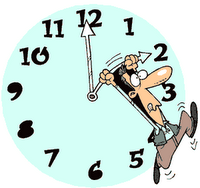Chris's last post got me thinking. Why in the world do we observe Daylight Saving Time?
Here's a brief history, courtesy of Wikipedia:
- The idea of DST was first put into practice by the German government during the First World War, between April 30, 1916 and October 1, 1916. Shortly afterward, the United Kingdom followed suit, first adopting it between May 21 and October 1, 1916. On June 17, 1917 Newfoundland became the first North American jurisdiction to adopt DST with the passing of the Daylight Saving Act of 1917. On March 19, 1918, the U.S. Congress established several time zones, which had been in use by railroads and most cities since 1883 and made DST official, effective March 31, for the remainder of World War I. It was observed for seven months in 1918 and 1919. The law, however, proved so unpopular, mostly because people rose and went to bed earlier than in current times, that it was repealed in 1919, when Congress overrode President Woodrow Wilson's veto of the repeal. ...
... DST was reinstated in the United States on February 9, 1942, again as a wartime measure to conserve resources. This remained in effect until World War II began winding down and the requirement was removed on September 30, 1945. During this period, the official designation "War Time" was used for year-round DST. The year-round War Time was double daylight saving time without reverting back to standard time during the winter months. When entering double daylight saving time, clocks are advanced two hours instead of one hour. ...
... One of the major reasons given for observing DST is energy conservation. Theoretically, the amount of residential electricity needed in the evening hours is dependent both on when the sun sets and when people go to bed. Because people tend to observe the same bedtime year-round, by artificially moving sunset one hour later, the amount of energy used is theoretically reduced. A 1975 United States Department of Transportation study showed that DST would theoretically reduce the country's electricity usage by 1% from March to April, if implemented during these months.
 I'm sorry, but DST is a burden, a nuisance, a pain. Changing all those clocks and other electronic gadgets - no to mention the added pressure of remembering to switch out the smoke detector batteries - is a chore, and there always seems to be one clock that's forgotten. For me, it's the clock in the car.
I'm sorry, but DST is a burden, a nuisance, a pain. Changing all those clocks and other electronic gadgets - no to mention the added pressure of remembering to switch out the smoke detector batteries - is a chore, and there always seems to be one clock that's forgotten. For me, it's the clock in the car.With all the fuss that's made about this seasonal ritual, perhaps we should just go ahead and make it an official holiday. Seriously. We already have Halloween greeting cards, for crying out loud!
If you really want to know what time it is, I'll tell you: It's time to end this stupid ritual. I'm sorry, but I just don't buy the "energy conservation" argument that's based on studies done in the '70s. We live in an age of televisions, computers, and fax machines, most of which are running 24/7, regardless of how dark or light it is outside. And in addition to the havoc wreaked on our regular clocks, we come to find out that DST messes with our "circadian clocks."
Now, if someone were to suggest shutting down the government as part of Daylight Saving Time in an effort to save energy, then I would probably have to reconsider my position on the issue. At least that way they would have less time to come up with ridiculous ideas.

Ha!
ReplyDeleteFirst, I am among those individuals (I am terribly horrified to admit) who cannot control slipping in the 's' at the end of "saving." I suppose it's like "Sadie Hawkins Dance" now becoming "Sadies."
Second, that blasted car clock is always the last to go...and it's always prompted by a near heart palpitation when I think I'm either late or utterly confused.
Fun times.
By the way, Lee.
ReplyDeleteHappy Daylight Saving Time.
Hey! Let's try to keep the insults to a minimum, okay?
ReplyDelete